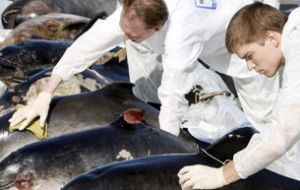MercoPress. South Atlantic News Agency
Increasing threat to sea mammals from climate change
 Greenpeace activists clean the dead bodies of small whales and dolphins in front of the Brandenburg Gate in Berlin
Greenpeace activists clean the dead bodies of small whales and dolphins in front of the Brandenburg Gate in Berlin Whales, dolphins and porpoises are facing increasing threats from climate change, according to a new report published by Whale and Dolphin Conservation Society and World Wildlife Fund ahead of the 59th meeting of the International Whaling Commission.
The report Whales in hot water?highlights the growing impacts of climate change on cetaceans. They range from changes in sea temperature and the freshening of the seawater because of the melting of ice and increased rainfalls, to sea level rise, loss of icy polar habitats and the decline of krill populations, in key areas. Krill â€" a shrimp-like marine animal that is dependent on sea ice, is the main source of food for many of the great whales. Accelerating climate change adds significantly to disturbances from other human activities, such as chemical and noise pollution, collisions with ships and entanglement in fishing nets, which kills some 1,000 cetaceans every day. "Whales, dolphins and porpoises have some capacity to adapt to their changing environment," said Mark Simmonds, International Director of Science at WDCS. "But the climate is now changing at such a fast pace that it is unclear to what extent whales and dolphins will be able to adjust, and we believe many populations to be very vulnerable to predicted changes." Climate change impacts are currently greatest in the Arctic and the Antarctic. According to the report, cetaceans that rely on polar, icy waters for their habitat and food resources â€" such as belugas, narwhal, and bowhead whales â€" are likely to be dramatically affected by the reduction of sea ice cover. And as sea ice cover decreases there will be more human activities, such as commercial shipping, oil, gas and mining exploration and development as well as military activities, in previously untouched areas of the Arctic. This will result in much greater risks from oil and chemical spills, worse acoustic disturbance and more collisions between whales and ships," said the lead author of the report, Wendy Elliott, from WWF's Global Species Programme. Other projected impacts of climate change listed in the report include: reduction of available habitat for several cetacean species unable to move into colder waters (e.g. river dolphins); the acidification of the oceans as they absorb growing quantities of CO2; an increased susceptibility of cetaceans to diseases; and reduced reproductive success, body condition and survival rates. Climate change could also be the nail in the coffin for the last 300 or so endangered North Atlantic right whales, as the survival of their calves has been directly related to the effects of climate variability on prey abundance. WDCS and WWF are urging governments to cut CO2 emissions by at least 50% by the middle of this century. The latest report of the Intergovernmental Panel on Climate Change showed it was possible to stop global warming if the world's emissions start to decline before 2015. The two conservation organizations further call on the International Whaling Commission to facilitate research on future impacts of climate change on cetaceans, including supporting a special climate change workshop in the coming year; elaborating conservation and management plans in light of the climate change threat; and increasing efforts and resources to fight all other threats to cetaceans.




Top Comments
Disclaimer & comment rulesCommenting for this story is now closed.
If you have a Facebook account, become a fan and comment on our Facebook Page!